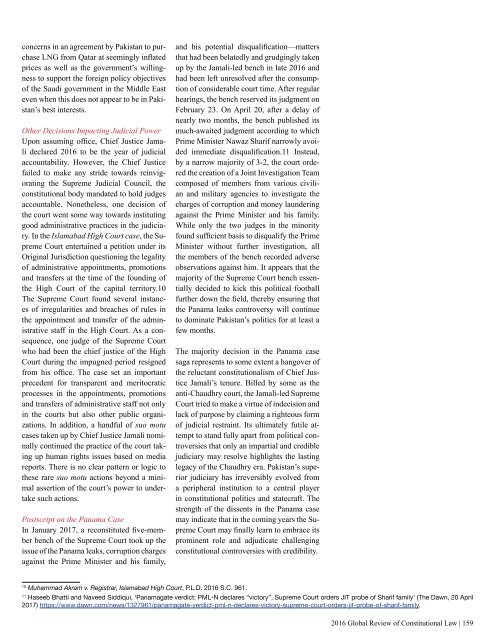2016 Global Review of Constitutional Law
I-CONnect–Clough Center collaboration.
I-CONnect–Clough Center collaboration.
You also want an ePaper? Increase the reach of your titles
YUMPU automatically turns print PDFs into web optimized ePapers that Google loves.
concerns in an agreement by Pakistan to purchase<br />
LNG from Qatar at seemingly inflated<br />
prices as well as the government’s willingness<br />
to support the foreign policy objectives<br />
<strong>of</strong> the Saudi government in the Middle East<br />
even when this does not appear to be in Pakistan’s<br />
best interests.<br />
Other Decisions Impacting Judicial Power<br />
Upon assuming <strong>of</strong>fice, Chief Justice Jamali<br />
declared <strong>2016</strong> to be the year <strong>of</strong> judicial<br />
accountability. However, the Chief Justice<br />
failed to make any stride towards reinvigorating<br />
the Supreme Judicial Council, the<br />
constitutional body mandated to hold judges<br />
accountable. Nonetheless, one decision <strong>of</strong><br />
the court went some way towards instituting<br />
good administrative practices in the judiciary.<br />
In the Islamabad High Court case, the Supreme<br />
Court entertained a petition under its<br />
Original Jurisdiction questioning the legality<br />
<strong>of</strong> administrative appointments, promotions<br />
and transfers at the time <strong>of</strong> the founding <strong>of</strong><br />
the High Court <strong>of</strong> the capital territory.10<br />
The Supreme Court found several instances<br />
<strong>of</strong> irregularities and breaches <strong>of</strong> rules in<br />
the appointment and transfer <strong>of</strong> the administrative<br />
staff in the High Court. As a consequence,<br />
one judge <strong>of</strong> the Supreme Court<br />
who had been the chief justice <strong>of</strong> the High<br />
Court during the impugned period resigned<br />
from his <strong>of</strong>fice. The case set an important<br />
precedent for transparent and meritocratic<br />
processes in the appointments, promotions<br />
and transfers <strong>of</strong> administrative staff not only<br />
in the courts but also other public organizations.<br />
In addition, a handful <strong>of</strong> suo motu<br />
cases taken up by Chief Justice Jamali nominally<br />
continued the practice <strong>of</strong> the court taking<br />
up human rights issues based on media<br />
reports. There is no clear pattern or logic to<br />
these rare suo motu actions beyond a minimal<br />
assertion <strong>of</strong> the court’s power to undertake<br />
such actions.<br />
Postscript on the Panama Case<br />
In January 2017, a reconstituted five-member<br />
bench <strong>of</strong> the Supreme Court took up the<br />
issue <strong>of</strong> the Panama leaks, corruption charges<br />
against the Prime Minister and his family,<br />
and his potential disqualification —matters<br />
that had been belatedly and grudgingly taken<br />
up by the Jamali-led bench in late <strong>2016</strong> and<br />
had been left unresolved after the consumption<br />
<strong>of</strong> considerable court time. After regular<br />
hearings, the bench reserved its judgment on<br />
February 23. On April 20, after a delay <strong>of</strong><br />
nearly two months, the bench published its<br />
much-awaited judgment according to which<br />
Prime Minister Nawaz Sharif narrowly avoided<br />
immediate disqualification.11 Instead,<br />
by a narrow majority <strong>of</strong> 3-2, the court ordered<br />
the creation <strong>of</strong> a Joint Investigation Team<br />
composed <strong>of</strong> members from various civilian<br />
and military agencies to investigate the<br />
charges <strong>of</strong> corruption and money laundering<br />
against the Prime Minister and his family.<br />
While only the two judges in the minority<br />
found sufficient basis to disqualify the Prime<br />
Minister without further investigation, all<br />
the members <strong>of</strong> the bench recorded adverse<br />
observations against him. It appears that the<br />
majority <strong>of</strong> the Supreme Court bench essentially<br />
decided to kick this political football<br />
further down the field, thereby ensuring that<br />
the Panama leaks controversy will continue<br />
to dominate Pakistan’s politics for at least a<br />
few months.<br />
The majority decision in the Panama case<br />
saga represents to some extent a hangover <strong>of</strong><br />
the reluctant constitutionalism <strong>of</strong> Chief Justice<br />
Jamali’s tenure. Billed by some as the<br />
anti-Chaudhry court, the Jamali-led Supreme<br />
Court tried to make a virtue <strong>of</strong> indecision and<br />
lack <strong>of</strong> purpose by claiming a righteous form<br />
<strong>of</strong> judicial restraint. Its ultimately futile attempt<br />
to stand fully apart from political controversies<br />
that only an impartial and credible<br />
judiciary may resolve highlights the lasting<br />
legacy <strong>of</strong> the Chaudhry era. Pakistan’s superior<br />
judiciary has irreversibly evolved from<br />
a peripheral institution to a central player<br />
in constitutional politics and statecraft. The<br />
strength <strong>of</strong> the dissents in the Panama case<br />
may indicate that in the coming years the Supreme<br />
Court may finally learn to embrace its<br />
prominent role and adjudicate challenging<br />
constitutional controversies with credibility.<br />
10<br />
Muhammad Akram v. Registrar, Islamabad High Court, P.L.D. <strong>2016</strong> S.C. 961.<br />
11<br />
Haseeb Bhatti and Naveed Siddiqui, ‘Panamagate verdict: PML-N declares “victory”, Supreme Court orders JIT probe <strong>of</strong> Sharif family’ (The Dawn, 20 April<br />
2017) https://www.dawn.com/news/1327961/panamagate-verdict-pml-n-declares-victory-supreme-court-orders-jit-probe-<strong>of</strong>-sharif-family.<br />
<strong>2016</strong> <strong>Global</strong> <strong>Review</strong> <strong>of</strong> <strong>Constitutional</strong> <strong>Law</strong> | 159


